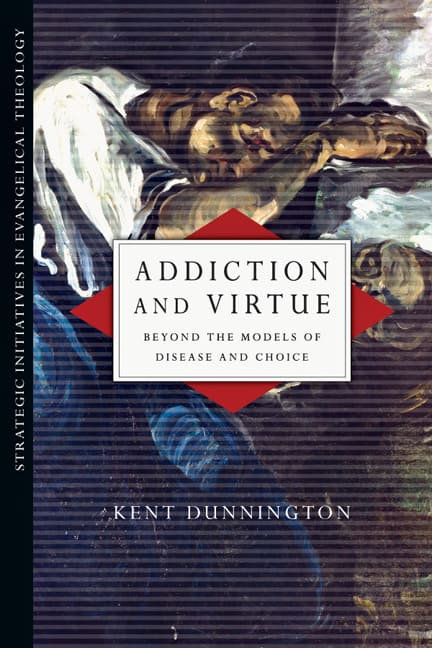I recall vividly a conversation with a colleague about what he thought to be the sad state of campus ministry. He especially eschewed the “soft overemphasis on personal piety at the expense of intellectual rigor” by deeming their gatherings “milk and cookies with Bible study.” When I suggested that groups like InterVarsity did not fit his characterization, he snidely proffered, “Yes, milk and cookies, Bible study and a book!”

After reading Kent Dunnington’s Addiction and Virtue: Beyond the Models of Disease and Virtue, an InterVarsity Press title, I can only respond that if a campus ministry consisted of milk, cookies, the Bible and this book, there would be no doubt as to that group’s intellectual rigor. This well-reasoned philosophical treatment of addiction offers a strong corrective to the polarized positions on addiction as either a moral choice or a disease; it does so in two ways—by rigorous analysis of the weaknesses of both views and by the introduction of Thomas Aquinas’ notion of “habit” as a mediating category.
Herein lies the challenge for the reader. One must patiently move through the detailed philosophical argument in order to understand that Dunnington’s assertion of “addiction as habit” does not treat habit in its current popular definition but as a theologically and philosophically robust term. Dunnington describes habit as “a relatively permanent acquired modification of a person that enables the person, when provoked by the relevant stimulus, to act consistently, successfully, and with ease with respect to some objective.” (Yes, the language is that academic throughout.) Having read his full argument, I question his use of the word “successfully.” Dunnington insists that addiction represents an attempt by an individual to provide meaning, order, devotion, and purpose in a postmodern world absent of these things. In that regard, he calls the addict an “unwitting prophet” whose quest can instruct others who live content with soft relativism and personal comfort.
So what about “sin”? Yes, Dunnington does eventually move to contextualize addiction within this theological category, but only after insisting—rightly, I believe—that the term be removed from popular mischaracterizations of sin and recover its “robust” biblical and theological heritage. Indeed, the reader must be patient with the author, who waits until more than halfway through the text before introducing specifically theological terminology and argument. As the author explains, this is not “a self-help book on addiction,” nor an effort “that will help the church better respond to addicted persons.”
The ultimate takeaway for the informed Christian who faithfully wades through the intricately woven yet accessible argument is what the church “has to learn from those intentional communities in which recovery is happening.”
Rather, the ultimate takeaway for the informed Christian who faithfully wades through the intricately woven yet accessible argument is what the church “has to learn from those intentional communities in which recovery is happening.” This includes “treating its members as repentant sinners,” which teaches dependence on God and not self-righteousness; developing friendships that require “that its members enter into certain kinds of relationships that are structured toward a particular end,” which “lives out the Aristotelian insight that one of the chief purposes of friendship is ‘training in virtue’”; and recognizing that “transformative friendship requires physical proximity and the sharing of considerable amounts of time together.” As a Christian in recovery, I found myself nodding in quiet assent when I considered the “necessity” of such practices in AA in my own life and how difficult it has been to find them practiced in the church before finding my current congregation.
Additionally, churches need to become more theologically solid with respect to their doctrine, worship, and relational life, for the sake of those folks who struggle with addiction and for its own health and well-being. To that end, the addict indeed becomes an “unwitting prophet” whose journey can benefit the whole of the church.
It was hard work making it through this text with my impatient, addicted personality. And it was worth it, but it definitely put me in the mood for some milk and cookies!
Harold Dean Trulear is director of the Healing Communities Prison Ministry and a fellow at the Center for Public Justice. He has written extensively on issues related to incarceration and is the coeditor of Ministry with Prisoners & Families: The Way Forward (Judson Press, 2011). A member of the Executive Session on Community Corrections at Harvard’s Kennedy School of Government, Dr. Trulear is also an associate professor of applied theology at Howard Divinity School in DC and on the pastoral staff of Praise and Glory Tabernacle in Philadelphia, Pa.

